University Nursing Essay: Communication Skills in Healthcare
VerifiedAdded on 2023/03/20
|7
|1480
|88
Essay
AI Summary
This essay critically analyzes the importance of interpersonal communication skills—listening, feedback, and questioning—in nursing practice. It emphasizes how these skills contribute to building therapeutic relationships with patients and achieving positive health outcomes. The essay defines active listening, highlighting its role in understanding patients' needs and preferences, and discusses the application of questioning techniques to assess patient understanding and gather necessary information for safe care. It also explores the value of feedback in improving nursing performance and ensuring patient satisfaction. Through the analysis of various academic sources, the essay argues that effective communication is crucial for patient-centered care, enhanced patient safety, and overall improvement in the quality of nursing practice. The essay references communication theory and provides a comprehensive overview of how these skills are applied within the nursing field to foster trust, facilitate accurate assessments, and ensure the delivery of high-quality care.
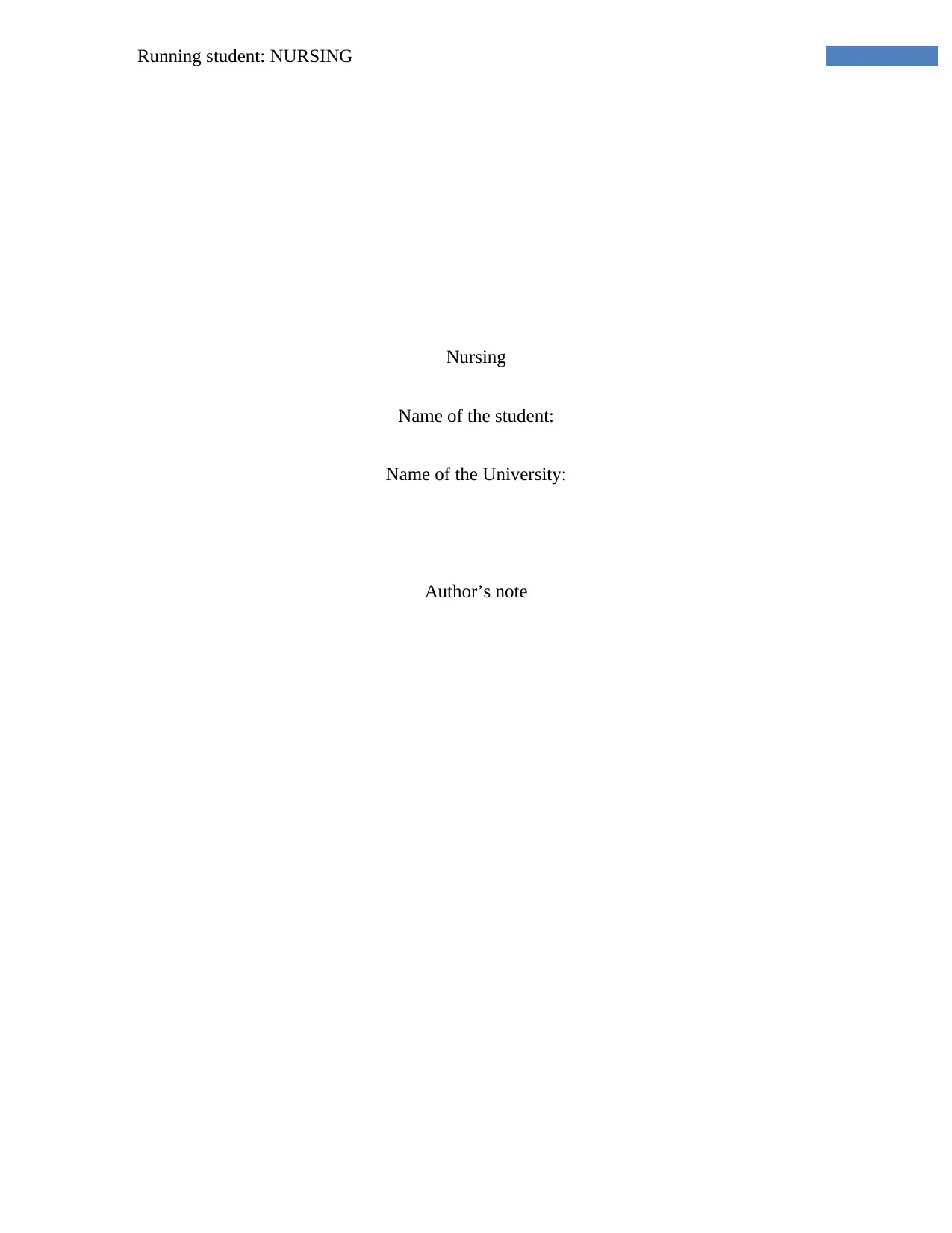
Running student: NURSING
Nursing
Name of the student:
Name of the University:
Author’s note
Nursing
Name of the student:
Name of the University:
Author’s note
Paraphrase This Document
Need a fresh take? Get an instant paraphrase of this document with our AI Paraphraser
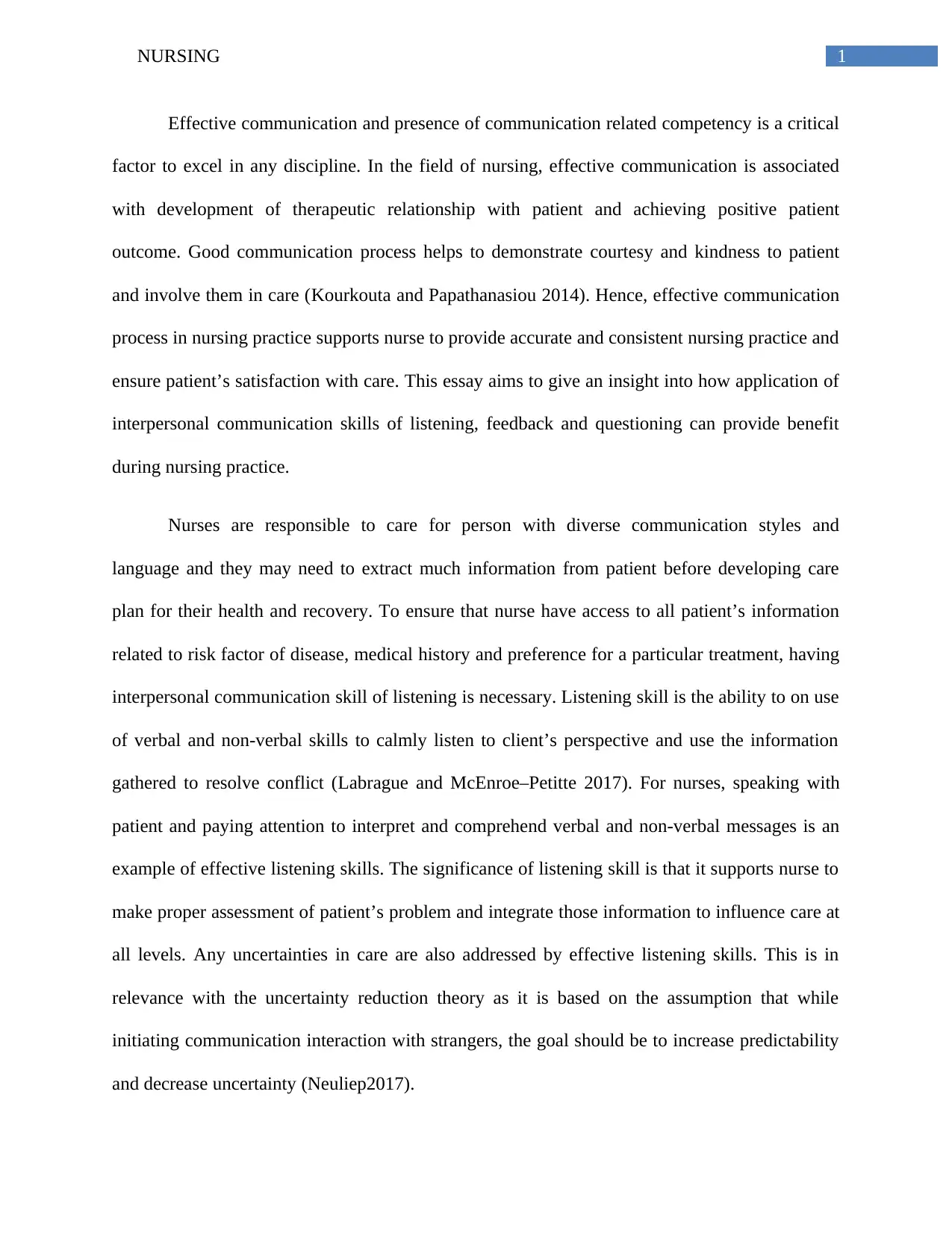
1NURSING
Effective communication and presence of communication related competency is a critical
factor to excel in any discipline. In the field of nursing, effective communication is associated
with development of therapeutic relationship with patient and achieving positive patient
outcome. Good communication process helps to demonstrate courtesy and kindness to patient
and involve them in care (Kourkouta and Papathanasiou 2014). Hence, effective communication
process in nursing practice supports nurse to provide accurate and consistent nursing practice and
ensure patient’s satisfaction with care. This essay aims to give an insight into how application of
interpersonal communication skills of listening, feedback and questioning can provide benefit
during nursing practice.
Nurses are responsible to care for person with diverse communication styles and
language and they may need to extract much information from patient before developing care
plan for their health and recovery. To ensure that nurse have access to all patient’s information
related to risk factor of disease, medical history and preference for a particular treatment, having
interpersonal communication skill of listening is necessary. Listening skill is the ability to on use
of verbal and non-verbal skills to calmly listen to client’s perspective and use the information
gathered to resolve conflict (Labrague and McEnroe–Petitte 2017). For nurses, speaking with
patient and paying attention to interpret and comprehend verbal and non-verbal messages is an
example of effective listening skills. The significance of listening skill is that it supports nurse to
make proper assessment of patient’s problem and integrate those information to influence care at
all levels. Any uncertainties in care are also addressed by effective listening skills. This is in
relevance with the uncertainty reduction theory as it is based on the assumption that while
initiating communication interaction with strangers, the goal should be to increase predictability
and decrease uncertainty (Neuliep2017).
Effective communication and presence of communication related competency is a critical
factor to excel in any discipline. In the field of nursing, effective communication is associated
with development of therapeutic relationship with patient and achieving positive patient
outcome. Good communication process helps to demonstrate courtesy and kindness to patient
and involve them in care (Kourkouta and Papathanasiou 2014). Hence, effective communication
process in nursing practice supports nurse to provide accurate and consistent nursing practice and
ensure patient’s satisfaction with care. This essay aims to give an insight into how application of
interpersonal communication skills of listening, feedback and questioning can provide benefit
during nursing practice.
Nurses are responsible to care for person with diverse communication styles and
language and they may need to extract much information from patient before developing care
plan for their health and recovery. To ensure that nurse have access to all patient’s information
related to risk factor of disease, medical history and preference for a particular treatment, having
interpersonal communication skill of listening is necessary. Listening skill is the ability to on use
of verbal and non-verbal skills to calmly listen to client’s perspective and use the information
gathered to resolve conflict (Labrague and McEnroe–Petitte 2017). For nurses, speaking with
patient and paying attention to interpret and comprehend verbal and non-verbal messages is an
example of effective listening skills. The significance of listening skill is that it supports nurse to
make proper assessment of patient’s problem and integrate those information to influence care at
all levels. Any uncertainties in care are also addressed by effective listening skills. This is in
relevance with the uncertainty reduction theory as it is based on the assumption that while
initiating communication interaction with strangers, the goal should be to increase predictability
and decrease uncertainty (Neuliep2017).
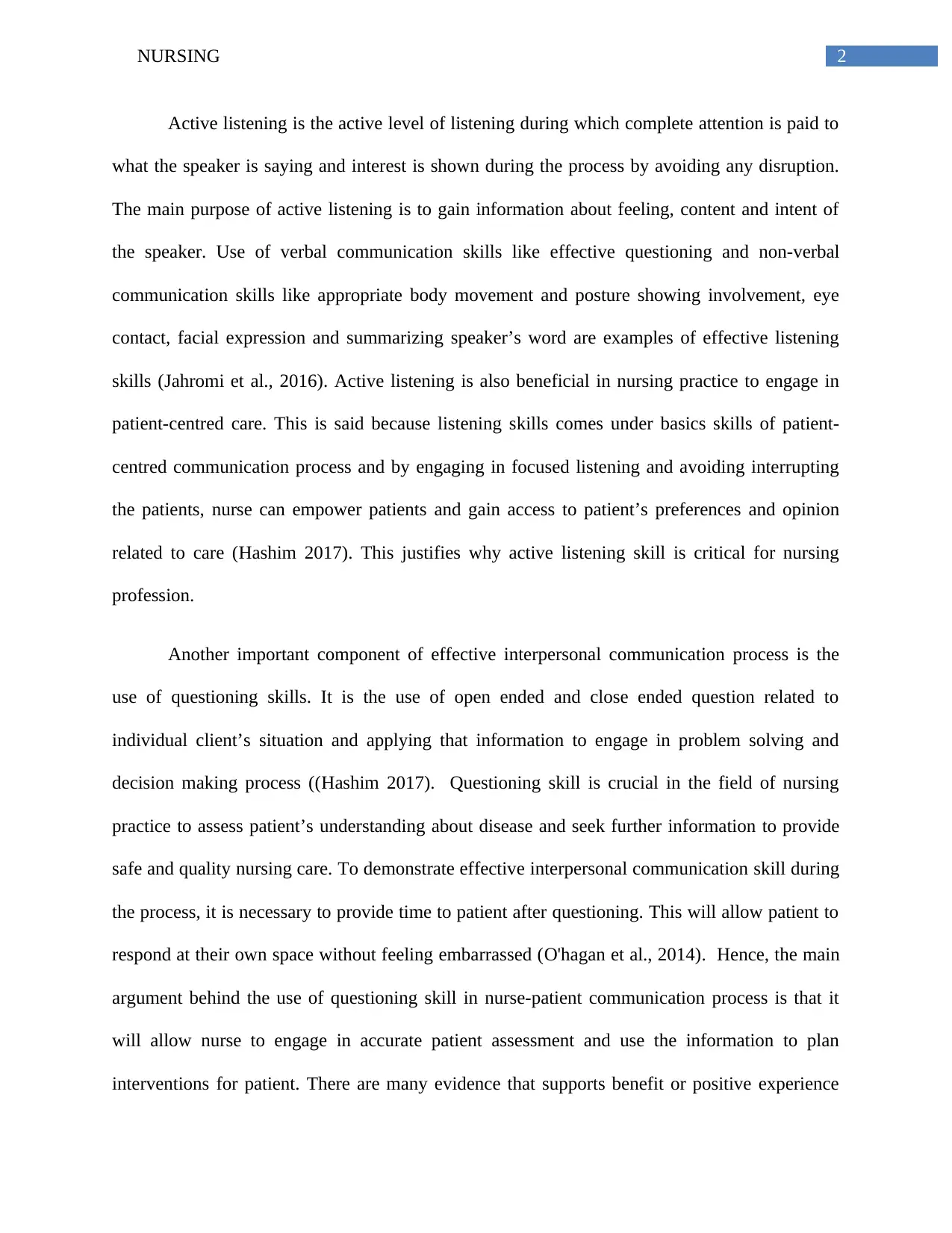
2NURSING
Active listening is the active level of listening during which complete attention is paid to
what the speaker is saying and interest is shown during the process by avoiding any disruption.
The main purpose of active listening is to gain information about feeling, content and intent of
the speaker. Use of verbal communication skills like effective questioning and non-verbal
communication skills like appropriate body movement and posture showing involvement, eye
contact, facial expression and summarizing speaker’s word are examples of effective listening
skills (Jahromi et al., 2016). Active listening is also beneficial in nursing practice to engage in
patient-centred care. This is said because listening skills comes under basics skills of patient-
centred communication process and by engaging in focused listening and avoiding interrupting
the patients, nurse can empower patients and gain access to patient’s preferences and opinion
related to care (Hashim 2017). This justifies why active listening skill is critical for nursing
profession.
Another important component of effective interpersonal communication process is the
use of questioning skills. It is the use of open ended and close ended question related to
individual client’s situation and applying that information to engage in problem solving and
decision making process ((Hashim 2017). Questioning skill is crucial in the field of nursing
practice to assess patient’s understanding about disease and seek further information to provide
safe and quality nursing care. To demonstrate effective interpersonal communication skill during
the process, it is necessary to provide time to patient after questioning. This will allow patient to
respond at their own space without feeling embarrassed (O'hagan et al., 2014). Hence, the main
argument behind the use of questioning skill in nurse-patient communication process is that it
will allow nurse to engage in accurate patient assessment and use the information to plan
interventions for patient. There are many evidence that supports benefit or positive experience
Active listening is the active level of listening during which complete attention is paid to
what the speaker is saying and interest is shown during the process by avoiding any disruption.
The main purpose of active listening is to gain information about feeling, content and intent of
the speaker. Use of verbal communication skills like effective questioning and non-verbal
communication skills like appropriate body movement and posture showing involvement, eye
contact, facial expression and summarizing speaker’s word are examples of effective listening
skills (Jahromi et al., 2016). Active listening is also beneficial in nursing practice to engage in
patient-centred care. This is said because listening skills comes under basics skills of patient-
centred communication process and by engaging in focused listening and avoiding interrupting
the patients, nurse can empower patients and gain access to patient’s preferences and opinion
related to care (Hashim 2017). This justifies why active listening skill is critical for nursing
profession.
Another important component of effective interpersonal communication process is the
use of questioning skills. It is the use of open ended and close ended question related to
individual client’s situation and applying that information to engage in problem solving and
decision making process ((Hashim 2017). Questioning skill is crucial in the field of nursing
practice to assess patient’s understanding about disease and seek further information to provide
safe and quality nursing care. To demonstrate effective interpersonal communication skill during
the process, it is necessary to provide time to patient after questioning. This will allow patient to
respond at their own space without feeling embarrassed (O'hagan et al., 2014). Hence, the main
argument behind the use of questioning skill in nurse-patient communication process is that it
will allow nurse to engage in accurate patient assessment and use the information to plan
interventions for patient. There are many evidence that supports benefit or positive experience
⊘ This is a preview!⊘
Do you want full access?
Subscribe today to unlock all pages.

Trusted by 1+ million students worldwide
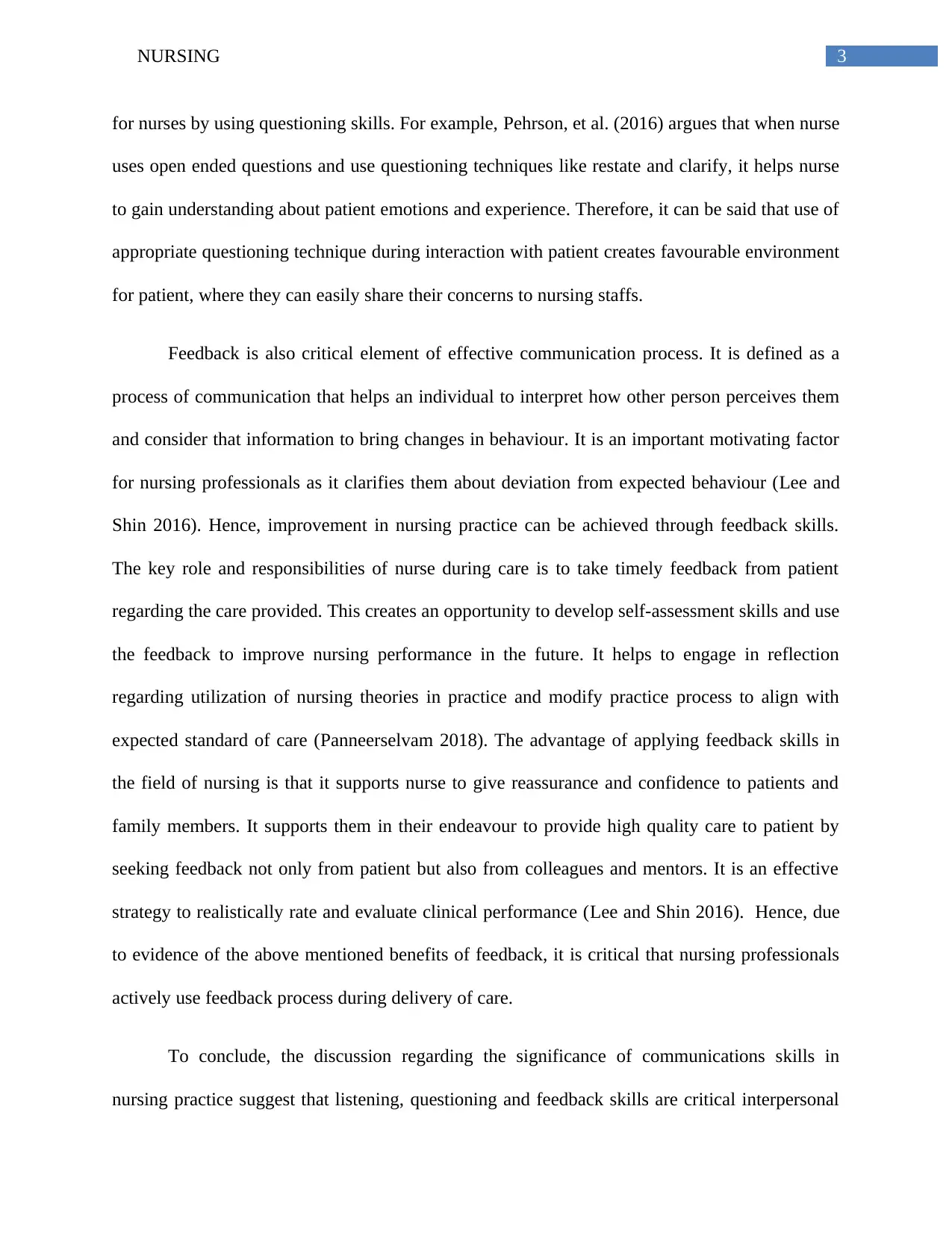
3NURSING
for nurses by using questioning skills. For example, Pehrson, et al. (2016) argues that when nurse
uses open ended questions and use questioning techniques like restate and clarify, it helps nurse
to gain understanding about patient emotions and experience. Therefore, it can be said that use of
appropriate questioning technique during interaction with patient creates favourable environment
for patient, where they can easily share their concerns to nursing staffs.
Feedback is also critical element of effective communication process. It is defined as a
process of communication that helps an individual to interpret how other person perceives them
and consider that information to bring changes in behaviour. It is an important motivating factor
for nursing professionals as it clarifies them about deviation from expected behaviour (Lee and
Shin 2016). Hence, improvement in nursing practice can be achieved through feedback skills.
The key role and responsibilities of nurse during care is to take timely feedback from patient
regarding the care provided. This creates an opportunity to develop self-assessment skills and use
the feedback to improve nursing performance in the future. It helps to engage in reflection
regarding utilization of nursing theories in practice and modify practice process to align with
expected standard of care (Panneerselvam 2018). The advantage of applying feedback skills in
the field of nursing is that it supports nurse to give reassurance and confidence to patients and
family members. It supports them in their endeavour to provide high quality care to patient by
seeking feedback not only from patient but also from colleagues and mentors. It is an effective
strategy to realistically rate and evaluate clinical performance (Lee and Shin 2016). Hence, due
to evidence of the above mentioned benefits of feedback, it is critical that nursing professionals
actively use feedback process during delivery of care.
To conclude, the discussion regarding the significance of communications skills in
nursing practice suggest that listening, questioning and feedback skills are critical interpersonal
for nurses by using questioning skills. For example, Pehrson, et al. (2016) argues that when nurse
uses open ended questions and use questioning techniques like restate and clarify, it helps nurse
to gain understanding about patient emotions and experience. Therefore, it can be said that use of
appropriate questioning technique during interaction with patient creates favourable environment
for patient, where they can easily share their concerns to nursing staffs.
Feedback is also critical element of effective communication process. It is defined as a
process of communication that helps an individual to interpret how other person perceives them
and consider that information to bring changes in behaviour. It is an important motivating factor
for nursing professionals as it clarifies them about deviation from expected behaviour (Lee and
Shin 2016). Hence, improvement in nursing practice can be achieved through feedback skills.
The key role and responsibilities of nurse during care is to take timely feedback from patient
regarding the care provided. This creates an opportunity to develop self-assessment skills and use
the feedback to improve nursing performance in the future. It helps to engage in reflection
regarding utilization of nursing theories in practice and modify practice process to align with
expected standard of care (Panneerselvam 2018). The advantage of applying feedback skills in
the field of nursing is that it supports nurse to give reassurance and confidence to patients and
family members. It supports them in their endeavour to provide high quality care to patient by
seeking feedback not only from patient but also from colleagues and mentors. It is an effective
strategy to realistically rate and evaluate clinical performance (Lee and Shin 2016). Hence, due
to evidence of the above mentioned benefits of feedback, it is critical that nursing professionals
actively use feedback process during delivery of care.
To conclude, the discussion regarding the significance of communications skills in
nursing practice suggest that listening, questioning and feedback skills are critical interpersonal
Paraphrase This Document
Need a fresh take? Get an instant paraphrase of this document with our AI Paraphraser
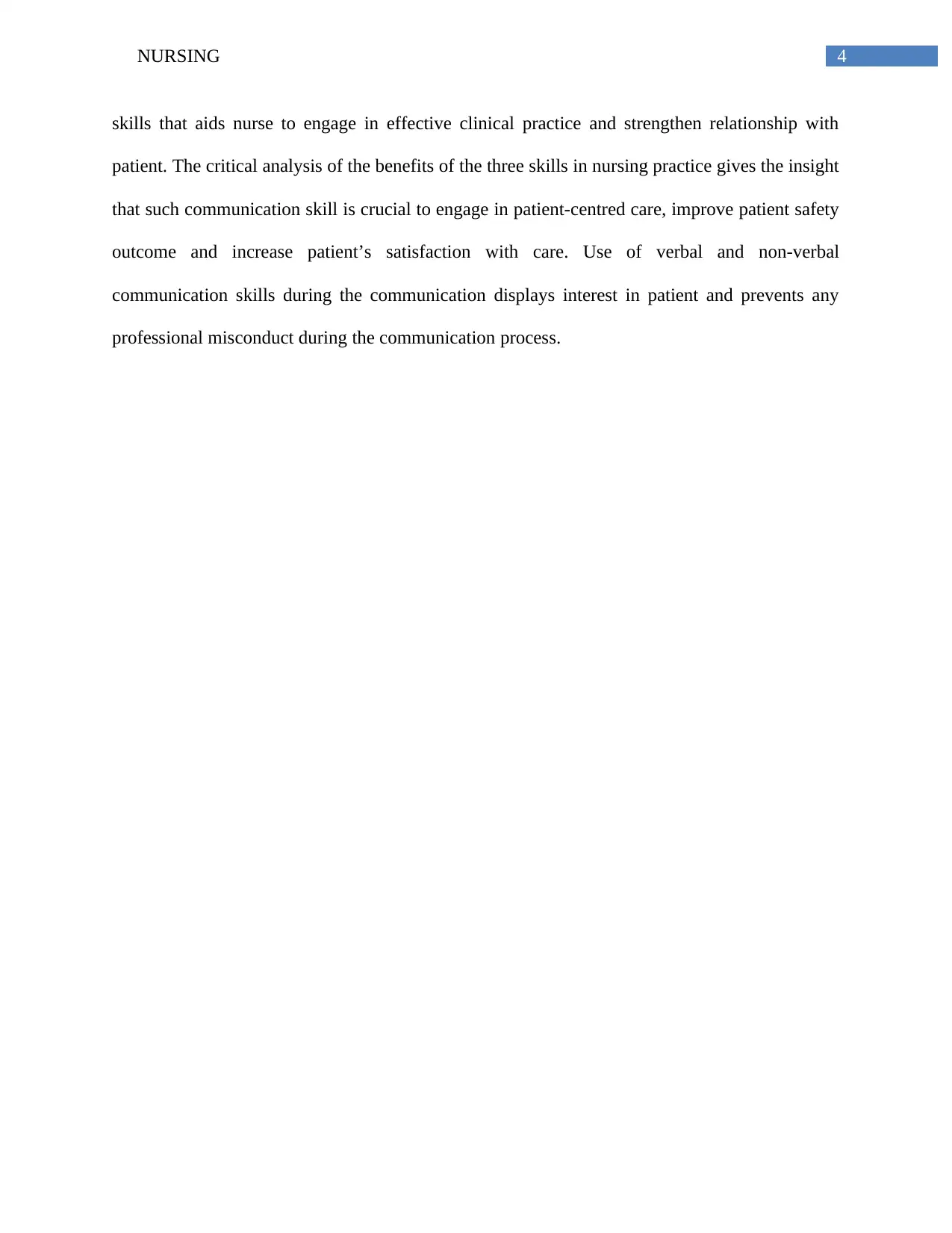
4NURSING
skills that aids nurse to engage in effective clinical practice and strengthen relationship with
patient. The critical analysis of the benefits of the three skills in nursing practice gives the insight
that such communication skill is crucial to engage in patient-centred care, improve patient safety
outcome and increase patient’s satisfaction with care. Use of verbal and non-verbal
communication skills during the communication displays interest in patient and prevents any
professional misconduct during the communication process.
skills that aids nurse to engage in effective clinical practice and strengthen relationship with
patient. The critical analysis of the benefits of the three skills in nursing practice gives the insight
that such communication skill is crucial to engage in patient-centred care, improve patient safety
outcome and increase patient’s satisfaction with care. Use of verbal and non-verbal
communication skills during the communication displays interest in patient and prevents any
professional misconduct during the communication process.
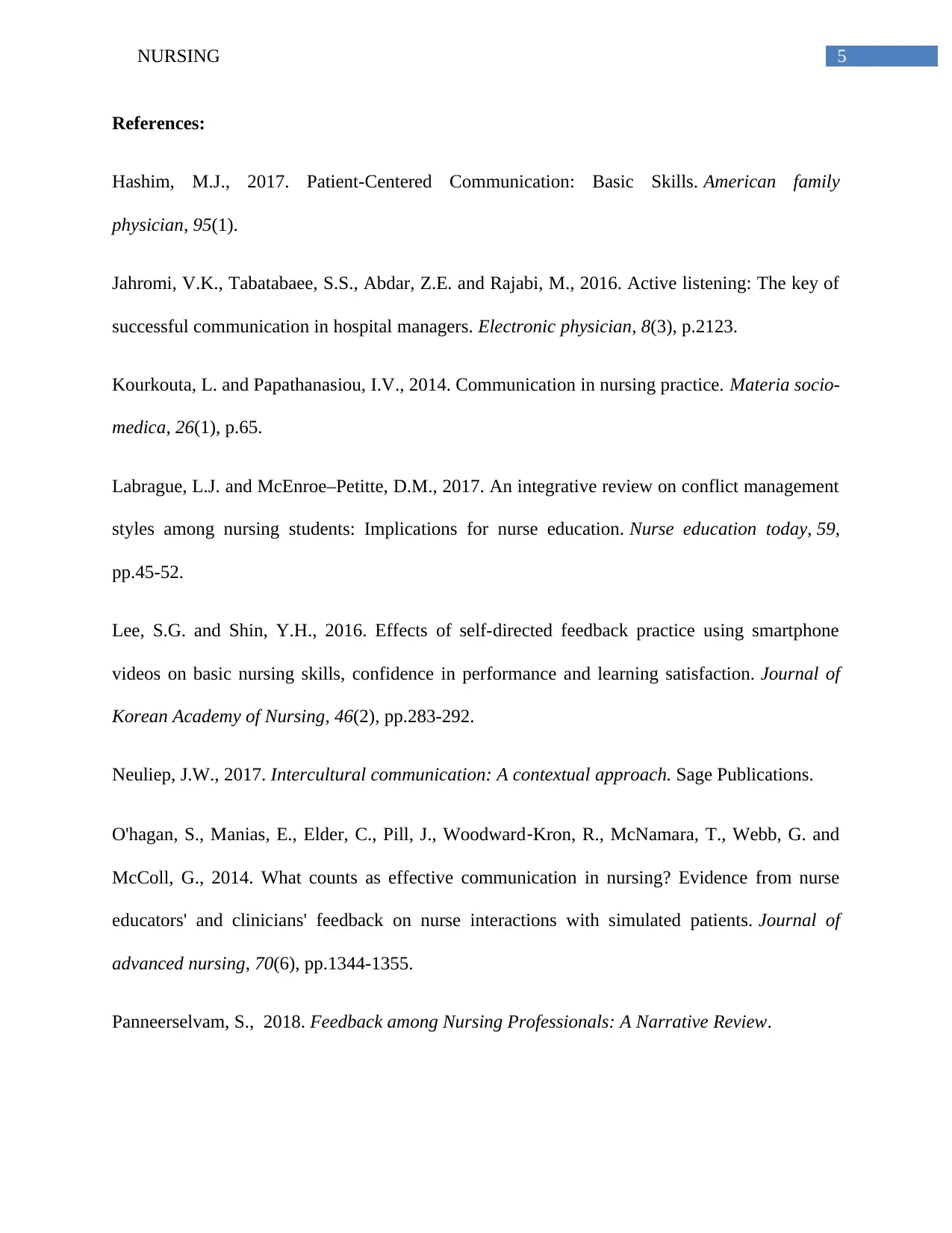
5NURSING
References:
Hashim, M.J., 2017. Patient-Centered Communication: Basic Skills. American family
physician, 95(1).
Jahromi, V.K., Tabatabaee, S.S., Abdar, Z.E. and Rajabi, M., 2016. Active listening: The key of
successful communication in hospital managers. Electronic physician, 8(3), p.2123.
Kourkouta, L. and Papathanasiou, I.V., 2014. Communication in nursing practice. Materia socio-
medica, 26(1), p.65.
Labrague, L.J. and McEnroe–Petitte, D.M., 2017. An integrative review on conflict management
styles among nursing students: Implications for nurse education. Nurse education today, 59,
pp.45-52.
Lee, S.G. and Shin, Y.H., 2016. Effects of self-directed feedback practice using smartphone
videos on basic nursing skills, confidence in performance and learning satisfaction. Journal of
Korean Academy of Nursing, 46(2), pp.283-292.
Neuliep, J.W., 2017. Intercultural communication: A contextual approach. Sage Publications.
O'hagan, S., Manias, E., Elder, C., Pill, J., Woodward‐Kron, R., McNamara, T., Webb, G. and
McColl, G., 2014. What counts as effective communication in nursing? Evidence from nurse
educators' and clinicians' feedback on nurse interactions with simulated patients. Journal of
advanced nursing, 70(6), pp.1344-1355.
Panneerselvam, S., 2018. Feedback among Nursing Professionals: A Narrative Review.
References:
Hashim, M.J., 2017. Patient-Centered Communication: Basic Skills. American family
physician, 95(1).
Jahromi, V.K., Tabatabaee, S.S., Abdar, Z.E. and Rajabi, M., 2016. Active listening: The key of
successful communication in hospital managers. Electronic physician, 8(3), p.2123.
Kourkouta, L. and Papathanasiou, I.V., 2014. Communication in nursing practice. Materia socio-
medica, 26(1), p.65.
Labrague, L.J. and McEnroe–Petitte, D.M., 2017. An integrative review on conflict management
styles among nursing students: Implications for nurse education. Nurse education today, 59,
pp.45-52.
Lee, S.G. and Shin, Y.H., 2016. Effects of self-directed feedback practice using smartphone
videos on basic nursing skills, confidence in performance and learning satisfaction. Journal of
Korean Academy of Nursing, 46(2), pp.283-292.
Neuliep, J.W., 2017. Intercultural communication: A contextual approach. Sage Publications.
O'hagan, S., Manias, E., Elder, C., Pill, J., Woodward‐Kron, R., McNamara, T., Webb, G. and
McColl, G., 2014. What counts as effective communication in nursing? Evidence from nurse
educators' and clinicians' feedback on nurse interactions with simulated patients. Journal of
advanced nursing, 70(6), pp.1344-1355.
Panneerselvam, S., 2018. Feedback among Nursing Professionals: A Narrative Review.
⊘ This is a preview!⊘
Do you want full access?
Subscribe today to unlock all pages.

Trusted by 1+ million students worldwide

6NURSING
Pehrson, C., Banerjee, S.C., Manna, R., Shen, M.J., Hammonds, S., Coyle, N., Krueger, C.A.,
Maloney, E., Zaider, T. and Bylund, C.L., 2016. Responding empathically to patients:
Development, implementation, and evaluation of a communication skills training module for
oncology nurses. Patient education and counseling, 99(4), pp.610-616.
Pehrson, C., Banerjee, S.C., Manna, R., Shen, M.J., Hammonds, S., Coyle, N., Krueger, C.A.,
Maloney, E., Zaider, T. and Bylund, C.L., 2016. Responding empathically to patients:
Development, implementation, and evaluation of a communication skills training module for
oncology nurses. Patient education and counseling, 99(4), pp.610-616.
1 out of 7
Related Documents
Your All-in-One AI-Powered Toolkit for Academic Success.
+13062052269
info@desklib.com
Available 24*7 on WhatsApp / Email
![[object Object]](/_next/static/media/star-bottom.7253800d.svg)
Unlock your academic potential
Copyright © 2020–2026 A2Z Services. All Rights Reserved. Developed and managed by ZUCOL.




